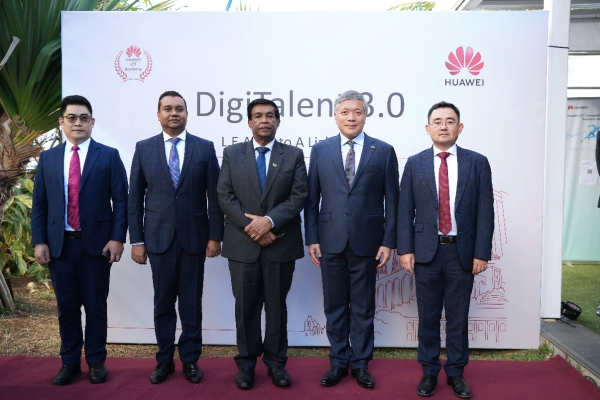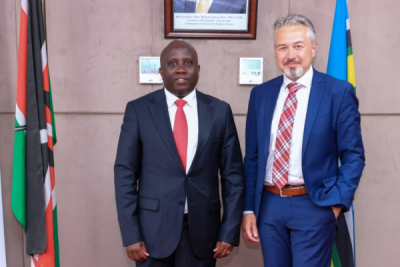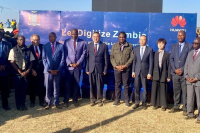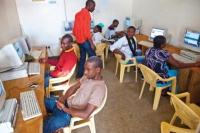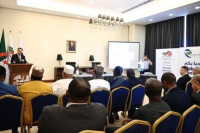
Tech (805)
Streamlining vehicle registration and documentation processes aids in combating vehicle-related crimes such as terrorism, banditry, kidnapping, and armed robbery. Digital systems can be adapted to provide real-time data to help law enforcement agencies track and recover stolen vehicles, enhancing overall security.
In a recent development, the Inspector-General of Police (IGP), Kayode Adeolu Egbetokun, has ordered the immediate suspension of the proposed enforcement of the digitalized Central Motor Registry (e-CMR), which was initially set to commence on July 29, 2024. This directive was announced in a press release dated July 14, just a day after the Nigeria Police Force (NPF) announced the deadline for vehicle owners to register for the e-CMR, costing N5,375 per vehicle.
The decision aims to provide sufficient time for mass enlightenment and education of all citizens and residents on the e-CMR process, its benefits, and its effectiveness in addressing vehicle-related crimes and protecting vehicle ownership.
"The Inspector-General of Police, IGP Kayode Adeolu Egbetokun, Ph.D., NPM, has ordered an immediate suspension of the proposed enforcement of the e-CMR initially scheduled to commence on the 29th of July, 2024. This is to give ample opportunity for mass enlightenment and education of all citizens and residents on the process, benefits and effectiveness in solving the challenge of vehicle-related crimes, and protection of individual and corporate vehicle ownership," the statement read.
In light of the suspension, the IGP has instructed all police officers to refrain from requesting e-CMR certificates. Any officer found extorting or exploiting the public under the guise of enforcing e-CMR compliance will face strict sanctions. The NPF clarified that the e-CMR is not intended as a revenue-generating platform but as a digital policing initiative aimed at enhancing public safety and security.
The e-CMR system is designed to enhance the safety and security of all vehicle types, including motorcycles. By collecting data from vehicle owners, the system can flag vehicles if reported stolen, provide the police with a comprehensive real-time database, prevent multiple registrations, and integrate biometric and other data into a national database. This integration will contribute to overall security and streamline incident reporting across various government agencies.
This suspension provides an opportunity for better public understanding and preparation for the eventual implementation of the e-CMR system, ensuring it effectively enhances vehicle security and ownership protection.
The Central Motor Registry (CMR) was initially launched in December 2022 to enable citizens to report stolen vehicles and assist in processing motor vehicle information, supporting police operations, and enhancing national security. This digitalization effort is part of a broader trend where African nations are increasingly adopting digital solutions to combat crime, improve governance, and streamline services.
Hikmatu Bilali
The digital sector offers numerous job opportunities for young people. By acquiring the right skills, they can take advantage of these opportunities and integrate more easily into the job market.
Chinese technology giant Huawei announced plans to train an additional 4,000 individuals in Information and Communication Technologies (ICT) in Mauritius by 2028. The commitment was unveiled on July 10th at the launch ceremony of DigiTalent 3.0, a program designed to address the nation's growing need for a skilled digital workforce.
"Mauritius has always been a pioneer in regional innovation. Our strategic investments in ICT infrastructure, combined with our commitment to fostering a knowledge-based economy, have laid a solid foundation for our digital future. Continuous training and skill enhancement are essential. Huawei's talent ecosystem is a brilliant example of how we can work together to build a thriving ICT talent pool in our country," said Deepak Balgobin, the Mauritian Minister of Information Technology, Communication, and Innovation.
This initiative aligns with Huawei's global strategy of cultivating digital talent in various countries. The approach emphasizes building ecosystems for educators and students, offering digital skills training to industry partners, and collaborating with governments on digital transformation initiatives.
In Mauritius, Huawei's contributions have resulted in the training of over 35 instructors and the development of courses in Artificial Intelligence, 5G, Datacom, and Cloud Computing. Over 350 students and professionals have earned Huawei's HCIA certification in recent years. The company has also established partnerships with seven local universities.
These combined efforts are expected to propel Mauritius towards achieving the objectives outlined in its "Digital Mauritius 2030" strategy. This national plan entails significant investments in infrastructure, digital skills training, and the transition to digital administration, all aimed at propelling the nation's digital sector. According to official figures, this sector thrived in 2022, experiencing a 6.5% growth rate and remaining the only sector unaffected by the global health crisis.
Samira Njoya
The Malagasy government has outlined an ambitious plan to harness the power of the technological revolution. They are actively pursuing a range of initiatives aimed at achieving substantial progress in a short timeframe.
On Wednesday, July 10, Malagasy Minister of Digital Development, Posts and Telecommunications (MNDPT), Tahina Razafindramalo, welcomed a delegation from Onepoint and Global Business Network International, two French companies specializing in digital technology, for a working meeting.
According to the ministry's statement, discussions focused on several key topics, including the interoperability of information systems and data used by the government, the implementation of e-governance, and the impacts of digital transformation on the Malagasy government and its citizens.
The meeting aligns with the government's ongoing efforts to strengthen the digital sector through innovative technological partnerships. Recently, the government visited South Korea to meet potential partners capable of supporting the digitalization of the agricultural sector, demonstrating its commitment to modernizing various sectors through technology.
Following the meeting, a partnership was announced with Onepoint to organize an event on July 11 and 12 titled "Mastering Data to Transform Madagascar." This event brings together representatives from both the public and private sectors to discuss the importance of data management in the country's digital transformation.
Global Business Network International, established in October 2004, specializes in computer programming and assisting companies in their digital transitions. Onepoint is known for its unique approach that combines technology with human intelligence to support its clients' digital transformation. These future collaborations promise to bring innovative and sustainable solutions to the digital development of Madagascar.
Samira Njoya
Africa, with its substantial untapped digital economic potential, stands to benefit greatly from strategic investments in technology. Such initiatives are crucial for enhancing competitiveness and fostering economic growth in the 21st-century global economy.
The Nigerian Communication Satellite (NIGCOMSAT) and Dimension Data, a South African IT and internet solutions provider, signed a one-year internet service agreement, on July 5. The agreement was signed by Jane Nkechi Egerton-Idehen, NIGCOMSAT's CEO, and Olugbenga Olabiyi, Dimension Data's country director.
“In line with the aspirations of the Hon. Minister of Communications, Innovation and Digital Economy, Dr. Bosun Tijani, to rejig the nation’s economy through digital transformation, the Nigerian Communication Satellite (NIGCOMSAT) Ltd, has once again signed a partnership agreement with Dimension Data, a leading IT solutions company, internet solutions service provider,” revealed NIGCOMSAT in a press release dated July 5
Under the deal, NIGCOMSAT will provide Dimension Data with internet services on the NigComSat-1R network for one year.
This partnership follows similar agreements Nigcomsat signed in June with satellite telecom providers, including Hotspot Network Limited, a leading company specializing in rural connectivity solutions, and telecom giant Infratel, to enhance rural connectivity.
The initiatives align with Nigcomsat's ambition to become a leading provider of satellite communications infrastructure in Nigeria and Africa, supporting the government's project to bring broadband to every corner of the country.
Hikmatu Bilali
Kenya, in its pursuit of technological partners to aid its digital transformation, is turning to international collaborations and strategic investments to achieve its goals. Germany stands out as a potential key partner in this endeavor.
German company Lufthansa Industry Solutions, specializing in IT consulting and systems integration, has recently announced its intention to invest in Kenya. On July 9, a delegation led by CEO Jörn Messner (photo, right) and Chief Commercial Officer Joern-Matthias Derrer met with John Kipchumba Tanui (photo, left), Principal Secretary for Information Technology, Communications, and Digital Economy of Kenya, to discuss potential collaborations.
"They are exploring Digital investment opportunities in Kenya, seeking potential partnerships and planning to establish their center in the country, joining major players like AWS and Microsoft. Kenya is actively encouraging such investments to boost economic growth and innovation," John Kipchumba Tanui announced on X.
Lufthansa Industry Solutions, a subsidiary of the German national airline Lufthansa, assists clients in their digital transformation. Their expertise includes implementing integrated flight folders (iFF) for pilots, digitizing documentation processes for airlines, providing private 5G networks for businesses, and more.
The proposed partnership with Kenya could strengthen local technological infrastructure and enhance the country’s digital capabilities. This initiative is part of a broader strategy to position Kenya as a regional tech hub, supporting its vision to become a digital innovation center in East Africa.
Samira Njoya
The development of an indigenous blockchain is crucial for Africa. By controlling its blockchain infrastructure, African countries can ensure data security and reduce dependency on foreign technology to promote technological advancement.
The National Information Technology Development Agency (NITDA) is considering developing an indigenous blockchain named Nigerium to protect national data and enhance security. NITDA’s Director General, Kashifu Abdullahi, announced this during a meeting with delegates from the University of Hertfordshire Law School.
During the meeting, the university delegation, led by Chanu Kuppuswamy, emphasized the importance of Nigeria controlling its blockchain to avoid foreign influence. “We want NITDA to consider developing an indigenous blockchain on which we can now think of putting all the public service and the land registries of the 36 states and Abuja,” Kuppuswamy said.
The delegation also suggested the creation of a "data embassy" to ensure digital continuity and protect data. This server, hosted in a third-party country but regulated by Nigerian law, would safeguard the nation's data. Additionally, the need for collaboration between government departments was highlighted to harmonize blockchain services.
A 2021 report by Enhancing Financial Innovation & Access (EFInA), a Nigerian Financial Sector Deepening (FSD) organization, reveals that Blockchain has the potential to increase Nigeria’s GDP by $29 billion by 2030, highlighting the significant economic impact of the adoption of a secure blockchain in the country.
This initiative falls in line with the country’s adoption of a national blockchain policy in 2023 and follows NITDA's plans to establish blockchain research centers across Nigeria, underscoring the country's commitment to leveraging blockchain technology for national development.
Hikmatu Bilali
By addressing crucial infrastructure gaps, rural communities gain access to global economic connectivity, digital services, and opportunities in digital education and e-commerce. These advancements establish the groundwork for sustainable socio-economic development in Africa, positioning these communities on the global stage.
Zambia inaugurated its first smart village project in Namwala, Southern District on July 5. Sponsored by Huawei Technologies, a leading Chinese firm, the initiative includes a communication tower and a solar power system designed to power numerous homes, marking a pioneering step in Zambia's rural development.
"We extend our sincere gratitude to Huawei Technologies Zambia for their support, which aligns with our government's digital agenda to foster rural development," stated Zambian President Hakainde Hichilema during the project's launch.
Deeply honored to have been the guest... - Hakainde Hichilema | Facebook
The launch event included the unveiling of a mini-solar plant equipped with solar panels as part of the Namwala project, underscoring Huawei's commitment to sustainable development. At the ceremony, Huawei Technologies Zambia also signed a memorandum of understanding with the Zambian government to establish 100 smart villages across the country's 10 provinces.
This initiative can accelerate the Zambian government's progress toward achieving the National Electronic Government Plan (NEGP) 2023-2026, which aims to leverage digital technologies for efficient public service delivery, with key focus areas including digital infrastructure and capacity building.
Zambia's progress in digital transformation has led to an improved ranking on the E-Government Development Index (EGDI), moving from 148th to 131st out of 193 countries between 2020 and 2022. It further reinforces Zambia's commitment to enhancing digital infrastructure and bridging the digital divide, contributing to its ongoing progress in e-governance and rural development.
Hikmatu Bilali
Affordable internet access is one of the top priorities of the United Nations' Sustainable Development Goals (SDGs). Despite efforts by organizations and governments across Africa, the high cost of internet remains a significant barrier to widespread use.
Africa remains the continent with the highest fixed internet costs in the world, according to the International Telecommunication Union (ITU). On the continent, users pay five times more than the global average for 5 gigabits (5 GB) of data. Globally, the price of broadband internet services averages 2.9% of monthly gross national income (GNI) per capita, while in Africa, it stands at a staggering 14.8%. The Broadband Commission, a specialized ITU body, considers internet costs affordable if they are equal to or below 2% of GNI.
In its June 2024 report, "The State of Broadband 2024: Leveraging AI for Universal Connectivity," the Broadband Commission attributes Africa's high internet costs to low purchasing power. "The lack of financial means remains a major barrier to internet access, especially in low-income economies. A significant gap persists between high-income economies and the rest of the world," the report states.
Beyond the issue of low purchasing power, the high cost of internet in Africa is also due to insufficient telecom infrastructure, which forces some markets to charge high prices to recoup investments. "Fixed broadband networks are very expensive to deploy, maintain, and upgrade, depending on the geography and extent of the territory to be covered," the ITU explains.
The Broadband Commission's October 2019 report, "Connecting Africa Through Broadband: A strategy for doubling connectivity by 2021 and reaching universal access by 2030," estimated that approximately $100 billion is needed to fully cover the continent with internet by 2030. Africa's reliance on foreign cables, with high international transit costs, remains a challenge for accessible fixed broadband on the continent.
This situation negatively impacts small and medium-sized enterprises (SMEs) in Africa, as the internet is essential in the digital transformation era. According to a survey by the International Finance Corporation and the World Bank, internet use for business purposes among 3,325 microenterprises in seven African countries averaged 7%, ranging from 24% in South Africa to 1% in Rwanda.
The Broadband Commission's primary goal is to make broadband affordable in developing countries by 2025. While achieving this goal in Africa next year remains uncertain, the commission notes that "ICT services tracked by the ITU have become more affordable in 2023 than ever before."
In 2022, the cost of fixed internet in Africa was 16.3% of monthly GNI per capita, down from 18.3% in 2021 and nearly 483% in 2009. Despite these improvements, much work remains to make internet access truly affordable and widespread across the continent.
Adoni Conrad Quenum
Tackling healthcare disparities intensified by conflict and displacement is crucial for building long-term resilience and self-sufficiency among refugees. Utilizing advanced technology allows for the provision of immediate medical aid, enhancing healthcare accessibility a vital element in the broader framework of African development and stability.
U.S. messaging platform Gupshup, Meta (formerly Facebook), the Sudan Medical Specialization Board, and Shabaka, a consulting and research organization dedicated to humanitarian issues, have jointly launched a telemedicine chatbot. The initiative, announced by Gupshup on July 3, aims to deliver medical assistance to Sudanese refugees.
“We are honored to be part of this humanitarian project that aims to provide essential healthcare services to Sudanese refugees in need. By leveraging the power of conversational AI and the reach of WhatsApp, we can make a significant impact on the lives of these individuals who have faced immense challenges,” said Beerud Sheth, Founder & CEO of Gupshup.
The chatbot, accessible via WhatsApp, targets refugees in Egypt, Eritrea, Saudi Arabia, Libya, Djibouti, and other neighboring countries. The telemedicine service offers a secure, regulatory-compliant platform supporting Arabic and English, with additional languages planned.
According to Gupshup, the project aims to meet the urgent healthcare needs of about 800,000 Sudanese refugees with limited access to medical services. The chatbot allows patients to connect with healthcare providers, who then route them to a triage team for assessment before linking them to one of over 18 specialty doctors.
The United Nations High Commissioner for Refugees (UNHCR) reveals that the ongoing conflict has left nearly 25 million people in Sudan in need of humanitarian assistance, with severe shortages of food, water, medicine, and fuel affecting millions. This underscores the importance of scalable, tech-driven solutions in humanitarian aid efforts to support vulnerable populations in crises effectively.
Hikmatu Bilali
Over the past two years, Algeria has doubled its international bandwidth capacity. In 2020, Algeria's international bandwidth was 1.5 Tbps (terabits per second). This has increased to 7.8 Tbps in 2022 and reached 9.8 Tbps in early 2024.
Algeria has made significant progress in strengthening its digital infrastructure by completing a 2,600 km segment of fiber optics, a key component of the Trans-Saharan Fiber Optic Backbone project (DTS). Abdelouahab Bara, the Secretary-General of the Ministry of Post and Telecommunications, announced this achievement on Sunday, July 7, in Algiers during the opening of the 5th session of the project's Liaison Committee.
According to Bara, the project aims to "create a technological dynamic that fosters the emergence of a digital economy in the concerned countries, contributing to the development of e-commerce on the continent and online financial services, as well as improving the business climate."
This initiative is part of the African Union's New Partnership for Africa's Development (NEPAD), aimed at continental integration and the development of the digital economy in the region. It connects six countries: Algeria, Niger, Nigeria, Chad, Mali, and Mauritania. The 79 million euro project is co-funded by the African Development Bank (AfDB) and the European Union (29 million euros) following a delegation agreement administered by the AfDB.
Algeria's connection to this trans-Saharan backbone aims to strengthen and diversify the national economy by increasing high-speed broadband connectivity. According to DataReportal, Algeria had 50.65 million active mobile cellular connections at the beginning of 2024, with a penetration rate of 110.2% of the population.
Once completed, the project will enhance regional connectivity with neighboring countries and support a range of electronic services. The agricultural, educational, health, and commercial sectors will benefit from this project, creating new opportunities, particularly new jobs, and improving incomes, especially in rural areas.
Samira Njoya
More...
Satellite technology is crucial for developing societies, impacting agriculture, navigation, banking, and mining by enhancing resource management, productivity, and sustainability. It supports sustainable development goals and aligns with global efforts to combat climate change and promote conservation.
EnduroSat, a Bulgarian aerospace company, announced on July 3 plans to partner with the Botswana International University of Science and Technology (BIUST) to build Botswana's first software-defined satellite, BOTSAT-1. The satellite, set to launch on SpaceX’s Transporter-13 mission by February 2025, will aid the country's mining and agricultural sectors.
“EnduroSat has been an exceptional partner in our journey to launch Botswana's first satellite. Their expertise and support have been invaluable, and we are excited about the progress we have made together. This partnership brings us closer to realizing our shared vision and underscores the strength of our mutual commitment to advancing space technology in Botswana,’’ said BIUST Vice Chancellor Professor Otlogetswe Totolo
BIUST engineers will collaborate with EnduroSat for the satellite's assembly and payload integration. BOTSAT-1 will feature a hyperspectral sensory camera with a spatial resolution of 32 meters at an altitude of 500 kilometers. SpaceX will oversee launch logistics and conduct rigorous testing to ensure a smooth process.
The satellite will provide critical data for resource management and sustainable development, aiding Botswana in addressing developmental challenges. It will enhance agricultural productivity and sustainability by tackling low productivity, water scarcity, and soil quality. High-quality images will help geologists identify potential mineral deposits and map access routes, providing essential information on land cover, including roads, tracks, and fences.
In 2023, Botswana was ranked 85th on the Global Innovation Index (GII), which captures the innovation ecosystem performance of 132 economies and tracks the most recent global innovation trends. The BOTSAT-1 project is expected to boost Botswana's position by enhancing its technological capabilities and fostering innovation in key sectors.
Hikmatu Bilali
Madagascar and South Korea have maintained bilateral relations since 1993. Both countries aim to strengthen this collaboration in the digital sector.
A Malagasy delegation, led by the Secretary-General of the Ministry of Agriculture and Livestock, Raharinomena Fanja, made an official visit to South Korea from June 28 to July 5. This mission, funded by the Korea World Bank Partnership Facility (KWPF), aimed to explore advancements in blockchain technology for managing agricultural input allocations.
"The mission illustrates how the Malagasy delegation is looking towards a foreign country, recognized for its expertise in the observed field, to explore a more efficient alternative approach than the one currently followed," the ministry stated.
During this visit, the Malagasy delegation met with various government and regulatory entities, including the Ministry of Science and ICT, the Korea Internet & Security Agency (KISA), and the Alliance of Blockchain Leading Digital Economy (ABLE). They also engaged with technology companies and startups specializing in blockchain, such as SK Telecom (SKT), SMART M2M, KONA I, and Ahnlab Blockchain Company, who showcased their innovations.
This visit aligns with the Malagasy government's efforts to strengthen the agricultural sector through innovative technological partnerships. Madagascar has faced numerous challenges, particularly climatic ones, with the country being the fourth most vulnerable to climate change according to the United Nations. Recurrent droughts and cyclones, whose frequency, duration, and intensity are increasing due to climate change, have significantly impacted agriculture.
In this context, the Rice Plus project for productivity and resilience of rural livelihoods, led by the Ministry of Agriculture and Livestock and funded by the World Bank, aims to introduce smart agricultural technologies and blockchain-based electronic programs for input allocations (seeds and fertilizers).
The mission enabled the Malagasy delegation to discover blockchain as a promising technology for the effective and secure management of digital vouchers. It also paved the way for new collaborations and innovations, marking an important step towards the digital transformation of agriculture in Madagascar.
Samira Njoya
Enhancing internet connectivity promotes digital inclusion across regions, ensuring more people have access to online resources, education, and opportunities. This aligns with broader efforts in Africa to bridge the digital divide and empower communities through technology.
Governor Chukwuma Soludo announced, on July 2, a 2,400km fibre optic network initiative to provide free Wi-Fi across Anambra State. Revealed during the swearing-in of the 2024 Batch ‘B’ Stream 1 NYSC members, the project aims to address internet connectivity challenges.
Soludo, represented by Martin Agbili, Permanent Secretary of the Ministry of Youth Development, emphasized youth empowerment and local enterprise support. He said, “My administration has articulated a deep-rooted policy towards the youths which corps members deployed to the state benefit.”
Nigeria, with its large population (accounting for 47% of West Africa’s total), a significant youth demographic (half of its 200 million people are under 30), and a robust mobile market, has immense potential in the digital economy. However, limited fixed broadband infrastructure in rural areas leaves many marginalized segments without Internet access. Strategic investments are crucial to fully unlock the country’s digital economic opportunities and transform lives, as highlighted by the World Bank assessment and Nigeria’s Economic Recovery and Growth Plan 2017–2020.
The network aims to boost digital infrastructure and economic opportunities in Anambra. It aligns with the ‘Everything Technology and Technology Everywhere’ vision of the state's governor.
Hikmatu Bilali
With less than a third of Africans having access to high-speed internet, broadband adoption remains uneven, with connectivity often being either costly or unreliable across the continent. However, initiatives are underway to address this disparity.
On Thursday, July 4, the International Telecommunication Union (ITU) announced the launch of the Africa Broadband Maps project in a statement made during the 2024 Global Symposium for Regulators in Kampala, Uganda. This broadband mapping initiative, supported by the European Commission, aims to establish mapping systems to encourage investment and digital transformation across Africa. With a budget of €15 million over four years, the project will initially benefit 11 countries: Benin, Botswana, Burundi, Côte d'Ivoire, Ethiopia, Kenya, Malawi, Nigeria, Uganda, Zambia, and Zimbabwe.
The initiative, led by the ITU's Telecommunication Development Bureau (ITU BDT), aligns with the organization's efforts to improve digital connectivity on a continent where internet access remains limited in many regions.
According to the "Connecting Africa through Broadband" report published by the Broadband Commission in 2019, an estimated $100 billion needs to be invested over ten years to provide comprehensive broadband coverage across Africa. About 80% of this amount is earmarked for the deployment and maintenance of networks, 17.5% for developing local digital skills, and approximately 2% for creating an appropriate regulatory framework.
The Africa Broadband Maps project aims to identify areas with insufficient broadband coverage or substandard internet speeds. The findings will enable policymakers to allocate resources efficiently, ensuring that investments in infrastructure expansion are both effective and equitable. This initiative is expected to play a crucial role in closing the digital divide and fostering economic growth, education, and innovation across the continent.
Samira Njoya



